What is krill oil?
Krill is a collective term for small invertebrate, shrimp-like marine animals belonging to the order Euphausiacea. They provide a food source for various fish species such as herring. Krill oil is the oil obtained from krill.

Krill oil vs fish oil
Krill oil and fish oil contain the omega 3 fatty acids DHA and EPA, but there is still a difference. Fish oils are fats, or in other words, triglycerides. Krill oil contains phospholipids (including sn2-DHA-LPC), which are better absorbed by the body than the triglycerides from fish. This allows the fatty acids (indicated as the blue line below in the image) to be better absorbed.

Improved blood values
In a study involving 120 subjects with mildly elevated LDL or triglycerides in their blood, the subjects were divided into four groups, including a placebo group, a fish oil group, and krill oil groups with different dosages. This study lasted 90 days.
From the above data it can be concluded that there is no change in the placebo group. Blood values did improve with 3 grams of fish oil and low krill oil intake. The dose of 2-3 grams of krill oil was even more effective. That dose increased HDL by 55-60 percent and lowered LDL by 37-39 percent. The concentration of triglycerides decreased by 27-28 percent. All effects of the group with 2-3 grams of krill oil were statistically significant.
Recommended dosage
To achieve the same results as the research, it is recommended to take a daily dose of 2-3 grams for the first 90 days. Afterwards, 0.5 grams of krill oil per day is sufficient to maintain the correct blood values and even improve them slightly.
More plus points for krill oil
Due to the anti-inflammatory properties of omega 3 fatty acids and the effect of DHA and EPA, krill oil can help with:
- Heart and vascular disease
- High LDL cholesterol
- Premature aging
- Alzheimer's and dementia
- Insulin insensitivity
- Type 2 diabetes
- Multiple sclerosis
- Lupus
- Rheumatoid
- Arthritis
- Crohn's disease
- Psoriasis
- PMS
- Depression
- Mood swings
- Schizophrenia
- Bipolar disorder
- Violent behavior
- Fear
- Joint pain
- Insomnia
- Preventing colon cancer, prostate cancer and breast cancer


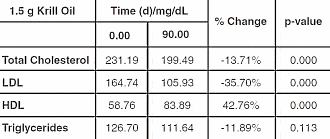
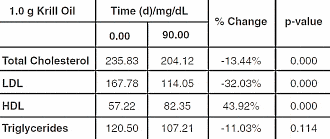
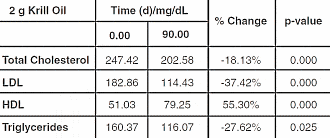
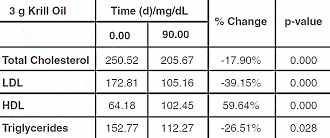
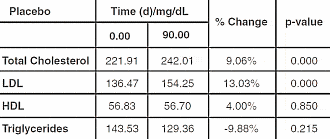
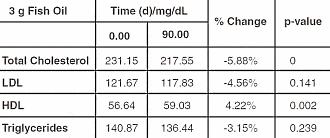
The positive cognitive change of DHA on the brain is that it causes BDNF to increase.
Also see: BDNF and brain